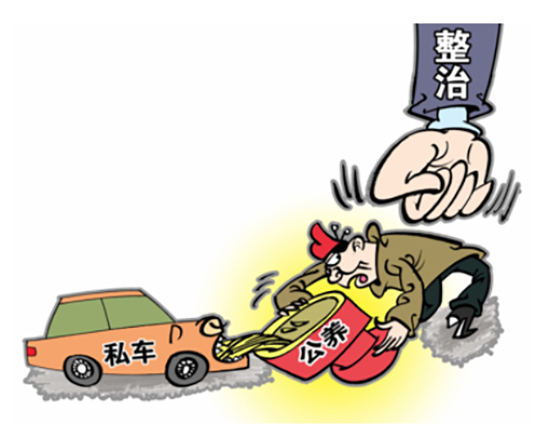


Interpol red notice fugitive Xu Xuewei returned to Beijing and surrendered to Chinese authorities. Photo: People.cn
Through new initiatives and even greater focus during 2017, the Communist Party of China (CPC) witnessed massive progress in the fight against corruption as their anti-graft efforts grew stronger. Thorough self-governance and strict discipline resulted in an overall strengthening of Party ability.
According to recent data from the CPC’s top anti-graft organ, 159,100 criminals were punished last year for corruption and violating CPC conduct codes.
During 2017, a total of 1,300 fugitives returned to China, bringing with them almost $150 million in recovered assets.
A recent public opinion poll revealed that over 90 percent of Chinese surveyed were satisfied with CPC anti-corruption efforts, a significant increase of roughly 20 percent from the same study in 2012.
The facts listed below reveal how the CPC achieved such remarkable goals.
Eight-point frugality code
The eight-point frugality code, introduced by the Political Bureau of the CPC Central Committee in December 2012, aims to rectify
Party and government officials' work style of formalism, bureaucratism, hedonism, and extravagance.

Hebei officials use intelligent data platforms to regulate government vehicles.Photo: People.cn
240,000 CPC officials
In the past five years, roughly 176,000 violations have been investigated, nearly 240,000 CPC officials punished, and some 128,000 officials were subjected to disciplinary action, according to the CPC Central Commission for Discipline Inspection (CCDI).
22.3 million square meters of government offices
Nearly 190 golf courses were closed, along with 625 offices that had been opened by Beijing authorities. The government cleared out almost 22.3 million square meters of unused government office space.
Taking out tigers and swatting flies
Since 2012, the CPC stepped up its fight against corruption, targeting both high-ranking "tigers" and low-level "flies.” President Xi Jinping said, “We must uphold the fighting of
tigers and flies at the same time, resolutely investigating law-breaking cases of leading officials and also earnestly resolving the unhealthy tendencies and corruption problems which happen all around people.”

Bringing down the tigers: China’s high-ranking officials.Photo: People.cn
278,000 low-ranking officials
In the same five years, 440 senior-ranking Party officials, at or above the ministerial level, were investigated, while over 8,900 bureau officials, 63,000 county officials, and 278,000 grassroots-level officials were punished according to Party discipline guidelines.
Discipline inspection
Discipline inspection is an essential tenet of the Party Constitution, and it’s a significant element designed to strengthen Party advancement while exercising strict self-governance, discipline, and internal Party supervision.
277 Party organizations
By the end of 2017, the Party’s Discipline Inspection Commission had conducted 12 inspection rounds at 277 Party organizations, re-examined four provincial-level regions, and four institutions, handing out punishment to those found to be in violation of Party rules. An astonishing amount of corruption was uncovered among low-ranking officials engaged in bribery, graft, and receiving illegal payments for position advancement. And many were found to be guilty of creating “small coteries” or factions with fellow officials.
Compiled by Bai Yuanqi
 Fire brigade in Shanghai holds group wedding
Fire brigade in Shanghai holds group wedding Tourists enjoy ice sculptures in Datan Town, north China
Tourists enjoy ice sculptures in Datan Town, north China Sunset scenery of Dayan Pagoda in Xi'an
Sunset scenery of Dayan Pagoda in Xi'an Tourists have fun at scenic spot in Nanlong Town, NW China
Tourists have fun at scenic spot in Nanlong Town, NW China Harbin attracts tourists by making best use of ice in winter
Harbin attracts tourists by making best use of ice in winter In pics: FIS Alpine Ski Women's World Cup Slalom
In pics: FIS Alpine Ski Women's World Cup Slalom Black-necked cranes rest at reservoir in Lhunzhub County, Lhasa
Black-necked cranes rest at reservoir in Lhunzhub County, Lhasa China's FAST telescope will be available to foreign scientists in April
China's FAST telescope will be available to foreign scientists in April "She power" plays indispensable role in poverty alleviation
"She power" plays indispensable role in poverty alleviation Top 10 world news events of People's Daily in 2020
Top 10 world news events of People's Daily in 2020 Top 10 China news events of People's Daily in 2020
Top 10 China news events of People's Daily in 2020 Top 10 media buzzwords of 2020
Top 10 media buzzwords of 2020 Year-ender:10 major tourism stories of 2020
Year-ender:10 major tourism stories of 2020 No interference in Venezuelan issues
No interference in Venezuelan issues
 Biz prepares for trade spat
Biz prepares for trade spat
 Broadcasting Continent
Broadcasting Continent Australia wins Chinese CEOs as US loses
Australia wins Chinese CEOs as US loses